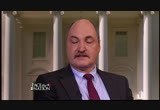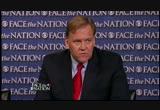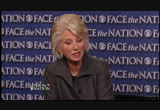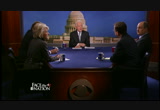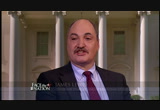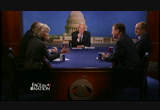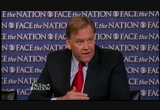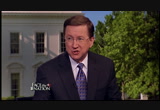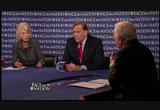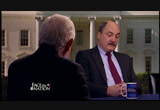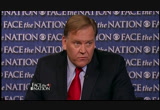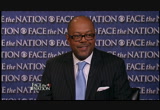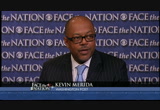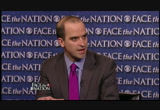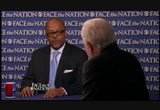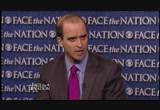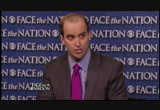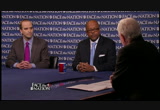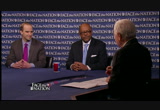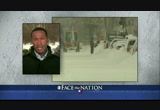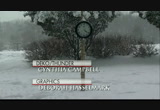tv Face the Nation CBS February 10, 2013 5:00pm-5:30pm PST
5:00 pm
think of them as near peers if not peers. and they've done the reconnaissance. they've thought about how to use it. we're really not in a good place. >> schieffer: mr. chairman how do you see all this? how serious is the threat of an attack and when we talk about an attack, what are we talking about? >> well there's really two different things happening here. one, we're getting robbed every single day. we have, as the u.s. government set up lawn characters total burglars where the silver is, in the bottom drawer, and opened the case of beer and watched them do it. if means everything from personal identities, social security numbers to money from banks, to intellectual property. the blueprints for jobs in the next generation with nation states slyke china, and it has gotten exponentially worse, even since the presidential debates. it is unbelievable and breathtaking. the second part of that is the attack part that we're so vulnerable for, actually shutting down our financial services or finding other ways to destroy material in companies
5:01 pm
that won't allow them to function on a day-to-day basis. and that is very, very concerning. we've seen that recently with iran. >> schieffer: jane what-- are we being attacked now? >> yes. keith islamabad the head alexander has said there have been 19 ear 20 substantial cyber attack in addition the last several years, more to come. i think we're much more vulnerable to a catastrophic cyber attack than a catastrophic terrorist attack in the homeland. we have done a better job of decapitating al qaeda. it's not capable i don't think, any more of an attack like 9/11. congress has not act. there have been several bills introduced, including one by my colleague and friend, mike but they haven't moved. and now the white house is mounting an executive order, which will not do enough, but
5:02 pm
it's not that the government is sleeping through this exactly. it's that the government has so far proved incapable of protecting all of us. and one last point-- i think everyone has read about the hack, of the bush family's e-mails and so forth, just in the last days. it's not only our defense space and our dot-goff space what the government does. it's our dot-com space, what private individuals do, and it's a serious, if you want to think about it be incursion on individual privacy in this country at this point and we have to act. >> schieffer: bob, companies are not all that keen on telling us when they are attacked. and in fact american businesses are being attacked. >> well, in big terms. chairman rogers said i think newscast this is a great pillaging of wealth. it's hard to put a number on it. some estimates $250 billion a year, up to i think chairman
5:03 pm
rogers' bill says $400 billion a year. the reason this goes on, bob is because-- let's say you're company a, you have to report to stockholders, you have constituents, you have competitors. you don't want to come out full face and say look my systemes were attacked because it suggests you might be vulnerable. to protect a competitive edge these companies i'm afraid to say are writing off these losses. >> schieffer: what are some of the things they do to these companies? >> a major paint manufacturer lost formulas. the chinese are replicating these products products about as a matter of fact they can and we're not doing very much about it. this is the first of what could be a very, very big problem if they turn this pillaging of wealth into attacking key systems. >> two things one, they're stealing the next generation of jobs. they're taking blueprints back not just military documents but civilian innovation that companies are going to use to create production lines to build things. they're stealing that
5:04 pm
repurposing it back in nations like china, and competing in the international market. to be fair however, there was a bill that passed bipartisan, we wrote a bill, passed the house of representatives. it did language in the democrat-controlled senate. we're going to try that again. as a matter of fact as early as this week, and it's very simple-- share information. share cyber threat information. the senior leadership in the intelligence said they think we can stop 90% of our problems by just sharing classified cyber-- >> schieffer: let me ask you let's just say somebody decided they wanted to attack the united states. i mean, somebody that wished us ill. what would they do? >> you have a whole range of things you could do. if you just wanted fun you could have all the traffic lights turn green at the same time here in washington during rush hour. but-- >> schieffer: all the traffic lights would turn green. >> how many of us would know that. the real target is the
5:05 pm
electrical grid and it would be really easy to cause a blackout. we saw this in 200three. that was an accident but you could destroy electrical generating capability through cyber attack and people say that as the target. the financial system, and the wave of iranian attacks against the leading banks. not that successful but the iranians haven't brought their "a" game to that electrical grirkd financial system, maybe a couple of other places. you could really disrupt things here if you want to. >> but there is a legislative issue. there was a competing bill last year by susan collins, a republican and joe lieberman, an independent, in the senate. and their bill did two things differently. it started out by saying the private sector has to cooperate on a mandatory basis, and some feel that's only way the whole private sector will cooperate. because they'll be tipped off first about these incursions. and the second thing it did was it gave the department of homeland security jurisdiction over the dot-com space.
5:06 pm
it can't all be in the pentagon. and that was different from this bill. and so-- >> the problem is it couldn't get out of committee, and couldn't get passed on the floor. we have one bipartisan solution. my argument is let's start with what we know, given all the threats. by the way if you want to see what else could happen on an individual company basis, iran attacked a saudi oil company the state-owned ahamaco, and did something fairly remarkable-- they destroyed 30,000 machinees, computeres manipulated data and made it so they couldn't reconstruct the data. if you apply that to businesses around the country, think of the economic chaos that that would cause. so what you saw with the banks -- this is interesting-- iranians doing a probing action trying to look for vulnerabilities, and what we know is now they have this other capability that's laying on the table. that's concerning. and so we've admired this problem long enough. it is time it take action and do something about it. >> schieffer: let me ask you this, is part of our defense,
5:07 pm
part of our defense be we have an offense, and in fact don't we already have an offense, and haven't we launched attacks on for example, the iranian nuclear facility? >> i have a life lesson, if you want to go punch your neighbor in the face, bob, ought to hit the weight room for a few months first. we are not prepared for what happened with a robust defensive capability. 95% of our network here's in the united states, private-sector networks incredibly vulnerable. most of which are penetrated already. >> but you raise something, bob and it's the whole subject of remote-control warfare. drones part of this, too. congress needs to enact a legislative framework around all these activities. i think it's past due. oversight by congress is essential, but i also think court review in the way that the courts review the fifa-- >> schieffer: wiretapping, things of that nature. >> correct. that can be the whole plan on the front end, and then an
5:08 pm
after-action report not all the individual targeting decisions. but i think this idea that surfaced in congress is a valid idea and fifa the write model. >> the thing to watch in the upcoming weeks, the white house will probably put out an executive order that will try and do some of the things that were in the bill, information sharing, protecting critical infrastructure. and until we see that executive order we won't know what the entire legislative agenda will have to look like. your bill is great, but we have to say what else do you need? and that's what the executive order will tackle. >> there's great resistance to this though. congresswoman harm an mentioned the lieberman bill. it started out as a mandatory sharing of information about attacks. that was then softened, i believe, to a voluntary sharing of information. and even that couldn't get through because the business community kicked back on, this is our business. this is a privacy issue." >> schieffer: too much government regulation. >> it's a real problem trying to
5:09 pm
find a solution-- >> this problem if done correctly, you're sharing information in real time. it moves at the speed of light. name one government regulation that needs the speed of a stanley steamer in 1908. this is 100 million times per second. these are 0s and 1s that make up as bs and cs on the computer, moving at light speed. if you are going to do this right you can't set up arbitrary standards so the company manages toa standard the government has dictated. what they'll tell you is, too slow too cumbersome. by the time you get them inked in law they don't work. that's why we created a voluntary system to share information. >> if they don't play, it's only as strong as the weakest link. and if some companies don't cooperate you have the vulnerablality we already have. that was the problem we have last year, and a lot of serious
5:10 pm
people, including keith alexander felt we needed-- >> schieffer: one of the things we can be thankful for, if that is the wordes nobody with the possible exception of us has a greater interest in the success of the american economy than the chinese do because they're so heavily invested here. but it seems to me the danger is not china or russia. it's some private actor or one of these terrorist states that get this access and as yet they do not seem to have the capabilities of the big powers. >> one of the things that changed the story since august when the legislation failed is the iranian activity-- i think the iranians-- you know, the chinese-- some chinese officials once said to me, "you don't have to worry about us disrupting wall street because we own it. so why would we do that?" fair point. same for the russians. but the iranians are a little crazier, and i think you're seeing a shift in industry as they think about we're facing pup more dynamic opponent. there's been another development, too, which both
5:11 pm
n.s.a., the national security agency, and their australian counter-parts have identified basic measures that really put us at risk so we can new say, "here's what you need to do to make us safer." the question is how do you get companies to go along and that's going to be a debate. >> schieffer: let's go around the table start with you jane. what do we need to do? >> on cyber? i think the councils-lieberman bill was the place to start and i think we should restart it looking at new threat and i think we need a legislative framework around drones. >> go for what we can pass in a bipartisan way. there is only one vehicle that can do that. by the way, those same senior intelligence officials say you pass this bill, a bipartisan bill solves 90% of our problem. that's a good first step. then i would go and try to attack the regulatory standards issues later in the year. >> get the executive order out. make critical infrastructure. do what they need to do. and, also think about how you
5:12 pm
engage the chinese at a senior level ask tell them there's got to be a limit and we haven't done that a lot. >> everyone has to take this seriously. for too long, cyber abe the subject wherize glaze over. people have to come to table and realize this is real. it's serious. it's eminent. and we need to pay the same kind of attention to this bob as we do to terrorism. >> schieffer: thank you all very much for a very good discussion. we'll be back way little reporter roundtable in just a minute.
5:13 pm
>> schieffer: and we're here now with david leonhardt, the "new york times" washington bureau chief. welcome to washington. this is a new assignment for you. and kevin merida, our old friend all the way back to the "dallas news" when i first knew kevin. he is now the number two guy at the "washington post," managing editor. glad to have both the of you
5:14 pm
here. we had quite a discussion this morning, starting with lindsey graham saying he was going to try to block the nomination of both chuck hagel, and john brennan, unless he gets some answers. is he being serious here david? >> well, i think we don't know. i think, clearly, republicans have signaled they're really worried, particularly about the hagel nomination, and of course the senate is a place where a single senator can often hold things up. it is true there are serious questions what went on in benghazi and also this would be a deeply unusual things to do. there were often serious questions about foreign policy betweens the party and the idea of holding up a nomination-- >> schieffer: two of them. >> two of them would be deeply unusual. >> these are very big appointments. these kinds of things happen all the time with smaller nominations and often we don't even find out who the senator is who is holding up the nomination. but this is, obviously, a very public play on the parent of senator grahams and i suspect
5:15 pm
there will be negotiations behind the scene. >> schieffer: do you think the republicans will back him? john mccain said he does not favor filibuster. i wonder if graham will have the backing. one senator can hold it up. clear me up on senate procedures. have to have 60 votes, wouldn't they to break that hold? >> i think a hold can sometimes keep away a vote of any number. i think what republicans are torn about here is the fact that on the one hand, they do think they have serious questions to raise about benghazi and that the american people have serious questions. on the other hand, when you get involved in libbia, there are always going to be things that go wrong. and i think republicans are worried about polling that have shown voters in general see themmals the party that has been more obstructionist and i think one of the reasons we have seen them compromise more since the election is they want-- they want to sort of sand of sand off the rough edges of their images
5:16 pm
and they're torn between wanting to push benghazi for substantive and political reasons and not wanting to be seen as "the party of no" as they do to many americans. >> and maybe the question of trying to get some answeres from the administration that they feel like they haven't goint, and there could be some negotiation. but i wouldn't be surprised if the nominations doesn't go forward. >> schieffer: we have the president's state of the union message coming up this week. it seems to me the partisan divide is about as wide and about as deep as it was before this election. what's your take? is anything going to happen? >> there is a tremendous divide but there are a lot of big subjects thrown on the issue. certainly issues like immigration reform, also guns in america and whether gun violence can be deterred but also the question of the state of the
5:17 pm
economy going forward, and that gets into the haves and have-notes and can you have a debate about income inequality in the country without it descending into class warfare. i think that's one of the bug questions facing the country. >> i think one of the really key things to look at going forward from the state of the union is this-- the hope yes, vote no caucus of the republicans in the house. this gets to 2 what i was just saying about republicans worried about their image here. they're a pretty substantial number of republicans in the the house, who because of the politics back home, want to vote against bills but because of the party's national standing want them to pass. and i think immigration-- less so guns. we have less chance of a really sweeping gun bill. but immigration i think it's going to be really interesting to see can obama move a substantial immigration bill through? and in fact republicans, including some who vote against it, want that to go through.
5:18 pm
>> schieffer: both of your organizations organizations have had your e-mail hacked. we saw this inexcusable hacking of the bush family's private e-mail inexcusable certainly in my view. i thought the way both the of your organizations handled it reflected well on you. i mean-- >> thank you. >> schieffer: you reported the hacking, but you didn't go ahead and use the results of it. what went into those decisions, david? >> well, with any of these issues whether it's national security issues or whether it's issues of privacy, you have to balance a lot of things. we're not just in the business of reporting everything right. we don't report everything about crime victims so you often have to balance these things. in the case of the hacking against us, we did what we do with stories involving other people. first we tried to put in place tougher security measures. there is suggestive evidence official people in chine arm involved involved in the hackings and it followed our reporting on senior leaders' families. and we put those measures in place and we went and can
5:19 pm
reported the story and essentially laid bare what we found out. >> schieffer: kevin, why did you print the pictures? >> i felt like we needed to report the fact that it happened. but wanted to be very discreet about the information that we put out for the public. and we thought that, you know the idea that it was being investigated a criminal investigation, that was important for people ton. to know. but we didn't need to invade the privacy. noflghts at stake national security-wise, or anything else related to the bush administration. >> schieffer: generally, as i was growing up the rules we all followed when we came upon personal information if we thought it impacted on the person's public responsibilities or if it showed him to be someone other than he pictured himself to be then that was-- it was fair and the public needed to know about that. but there's a difference in what is in the public interest and what is just in someone's
5:20 pm
self-interest who is just trying to get back at somebody for doing something. is that still pretty much the rules you all follow? >> i think clearly the rules have shifted. i think when people talk about what we know about president's personally as opposed to j.f.k. and l.b.j. was it better not to know about some of the personal behavior or is it better now? i think the standard you lay out in the general sense is the standard we should follow. we shouldn't report things just for the sake of reporting it. it should be does it have news value to make the judgments. >> and the media culture has shifted so dramatically when we have sites like deadspin and, you know, smoking begin, t.m.z. >> and just think there's a broader range of people operating out there. >> schieffer: all right. well listen, i want to thank both of you. these are dwheaz we all talk about when we're not on television just as reporters. we all try to grapple with it and they're questions that we still will have to deal with every day. thank you.
5:23 pm
>> schieffer: back now. we want to take one last check on that massive blizzard that hit the northeast. our cbs news correspondent terrell brown is in boston. terrell, what do you know? >> reporter: bob, good morning to you. crews will work today to clear roadways and try to restore power to about 345,000 customers that are still in the dark this morning. and it was a tough night if you do not have any heat. temperatures here in the boston area and really all across the northeast, down into the teens and single digits and power officials are saying it may be monday or tuesday before power is restored. nine deaths are now being blamed on the storm including an 11-year-old boy overcome by carbon monoxide as he sat in a car while his father shoveled snow off the vehicle. we're seeing planes taking off
5:24 pm
and landing at logan. amtrak restoring partial service, and mass transit will likely be back up and running in the boston area tomorrow. while all of this is happening, there are hint in the forecast of more wintry weather, maybe another winter storm, coming up later this week for the northeast, bob. >> schieffer: okay, thank you, terrell. hang in there and we'll be back in a moment. l go verify and lock. command is locked. five seconds. three, two, one. standing by for capture. the most innovative software on the planet... dragon is captured. is connecting today's leading companies to places beyond it. siemens. answers.
5:26 pm
>> schieffer: well, that's it for us today. on tuesday, former vice president dick cheney will be talking to charlie rose on "cbs this morning" at 7:00. at 9:00 p.m. i'll be joining scott pelley and the rest of the cbs news team for live coverage of president obama's state of union address. be sure to join us for both of those. and we'll see you right here next sunday on "face the nation." captioning sponsored by cbs captioned by media access group at wgbh access.wgbh.org
5:28 pm
5:29 pm
there. good evening. we begin with breaking news. kpix reporter is in santa clara county east of san jose tonight where a car with two people inside went over a cliff. what can you tell us about it? >> reporter: exactly right, ken, we are on mount hamilton road, that has been chosed for hours after -- closed for hours after this accident. a red corvette was going up the hill and over corrected or spun out and went over the cliff into a deep ravine. apparently this all happened right in front of a motorist who became a victim himself he told us what happened next. >> i pulled over a motorist and asked them to call 911 and i ran down the hill to see if i could help at all.
178 Views
IN COLLECTIONS
KPIX (CBS) Television Archive
Television Archive  Television Archive News Search Service
Television Archive News Search Service  The Chin Grimes TV News Archive
The Chin Grimes TV News Archive 
Uploaded by TV Archive on

 Live Music Archive
Live Music Archive Librivox Free Audio
Librivox Free Audio Metropolitan Museum
Metropolitan Museum Cleveland Museum of Art
Cleveland Museum of Art Internet Arcade
Internet Arcade Console Living Room
Console Living Room Books to Borrow
Books to Borrow Open Library
Open Library TV News
TV News Understanding 9/11
Understanding 9/11